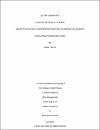Magnitude of RSV Fusion Protein-Specific Antibodies in Infants and Corresponding Mothers
Abstract
INTRODUCTION: Respiratory syncytial virus (RSV) is a threatening agent causing lower respiratory infections (LRI) among children, where no vaccine is available. RSV expresses three surface glycoproteins, of which the attachment (G) and fusion (F) are targets for neutralizing antibodies (Ab). Being essential for viral entry and highly-conserved, the F protein is a potential vaccine candidate. To overcome the irreversible transition from a metastable Pre-F to a stable Post-F conformation, cavity-filling-mutations have been designed and introduced to stabilize the F protein structure which harbor most of the neutralizing epitopes. This stabilized Pre-F is being considered to vaccinate pregnant females and to induce high-level of the maternal Abs that can be transferred to infants and protect them during their first critical months of life. Aim: To evaluate the level of maternal Abs in RSV-hospitalized children and to investigate their correlates to protection ability. METHODS: 65 blood samples and nasal aspirates were collected from RSV-infected children at the Pediatric Emergency Center (PEC) at Hamad Medical Corporation (HMC) in Qatar, along with blood samples from their corresponding mothers. Both maternal and infants’ sera were screened for the presence of Pre-F and Post-F Abs using ELISA and neutralization procedures. Further, the circulating RSV subgroups in Qatar were identified by PCR on nasal aspirates, followed by sequencing analysis. RESULTS: Children involved in this study raged in age between 0 and 6 months (mean: 1.7 ± 1.2). Relatively, low levels of anti-F Abs were detected in hospitalized children. Endpoint Ab titers to Pre-F in children ranged between 0.03 x 103 and 2.81 x 103 (mean: 0.97 x 103). Anti-F Abs titers in children showed positive-correlation with maternal Abs titers, and negative-correlation with infants’ age. Only 14% of maternal Abs were detected in infants, with an average of 0.97 x 103 and 1.12 x 103 Pre-F and Post-F end-point-titers, respectively. Unlike Post-F, Pre-F-adsorption diminished almost 80% of binding and neutralizing Ab-titers from both maternal and infants’ sera, indicating higher levels of Pre-F Abs. Molecular analysis showed interchangeable circulation of RSV subgroups throughout 2016/2017 and 2017/2018 winter seasons. There was an inverse correlation between infants’ anti-Pre-F Abs titers and virus titers in nasal swabs. F gene sequence analysis revealed site Ø and site II located mutations, some of them were never reported and probably need confirmation and others indicated resistance to Palivizumab. CONCLUSION: Our results indicate low-levels of maternal Abs in RSV-infected-infants, which partially explain children’s susceptibility to the disease. Vaccination of pregnant females in the last trimester of pregnancy with Pre-F-protein would guarantee the delivery of high levels maternal RSV Pre-F-specific-Ab-titers to neonates and thus protect then against RSV-infection during their first critical months of life.
DOI/handle
http://hdl.handle.net/10576/11194Collections
- Biomedical Sciences [66 items ]


